
News + Trends
Samsung at MWC - all guns blazing on fibre optics, 5G and the Internet of Things
by Dominik Bärlocher

Samsung opens the series of press conferences at the IFA in Berlin. The manufacturer presents a new smartwatch, an 8k television and allows speculation about its future.
The City Cube in Berlin is an exhibition hall that can hold 900 people on the lower floor for presentations. Journalists from all over the world have queued up to see Samsung's latest innovations, while the hall is illuminated with blue spotlights. But what are these new products? The Galaxy S9 series was released in spring and the Galaxy Note 9 a few days ago, so what's left? The highlight is clearly the new 8k television from the South Koreans.
Of course, Samsung is using the slogan "Do What You Can't" to advertise all kinds of devices. The Note 9, a washing machine, a fridge and a television.
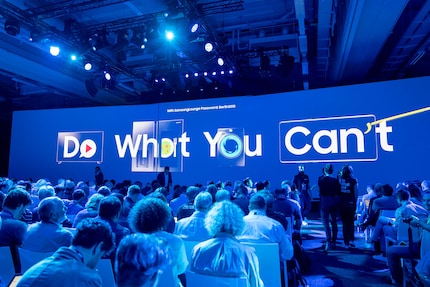
Samsung has already given itself away at Berlin Tegel Airport. There is a large poster advertising a television with a resolution of 8k, i.e. with a resolution of 7680×4320 pixels.
In recent years, however, it is not only screen technology that has changed, but also the way we watch television. As a result, says Guy Kinnell, Vice President Visual Display at Samsung, screens have increased in size and he expects the company to have sold 2.1 million TVs with a screen diagonal of over 75 inches by 2022.
Pounding bass and colourful animations herald the 8k revolution, which promises "perfect reality". Rarely has a television been better staged. The Q900R comes in 65, 75 and 82 inches and will be available globally very soon.
The brightness of the TV is 4000 nits. This is the Hollywood standard, says Kinnell. As 8k is not yet widespread, Samsung has thought of something: AI Upscaling. The lower-resolution content is intelligently blown up so that the pixels are not displayed the size of a fist. This works just as well with Netflix as it does with BluRays.
There is also AI Sound, which is designed to reproduce conversations in the film more clearly. Incidentally, when switched off, the screen can take on the colour of the wall, display a picture, the wallpaper or information for the day.
He also briefly mentions new soundbars. They have a 7.1.4 surround system.
The Frame was one of the TVs that mimicked a picture. Funny, but not really useful. Samsung, however, has developed the concept further and now calls it "The Wall". The Wall essentially describes a modular screen system that you can hang on your walls.
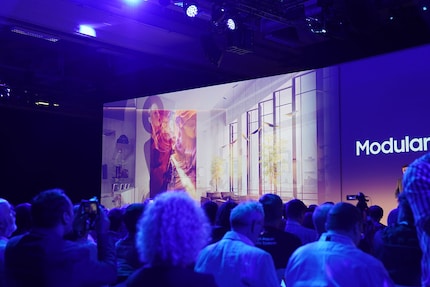
Kinnell shows beautifully edited images that show screens that break with the shape of the rectangle. Exciting.
The Frame also gets an update and comes with a screen diagonal of 49 inches.
HS Kim, CEO of Samsung Electronics, takes the stage. He begins his speech by saying that technology has undergone an evolution. "AI in IoT devices has gone from the fringe to the mainstream in 2018," he says. Samsung is fully committed to the trend. The skilful speaker calls for an open mind, because our world will change. The question is not whether this change will come, but what it will look like.
How can a company like Samsung make people's lives easier, give them control over their data and offer a full range of AI services, from kitchen appliances and household appliances to smartphones and headphones?
"No other company is better positioned for this project than Samsung."
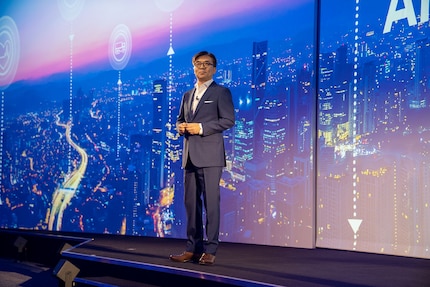
Samsung is expanding its AI labs globally. The one closest to Switzerland is in Cambridge, England. Others are in Seoul, Moscow and half a dozen other locations.
A home is more than just a place where we put our feet up, says HS Kim. We expect more from our household appliances. The laundry should be ready when we want it to be. Samsung's QDrive makes this possible. Televisions should be large and upscale images correctly, even from a low resolution.
At the heart of all these initiatives is Bixby. Samsung's voice assistant, which continues to lead a niche existence in Switzerland, is not only being used extensively but also serves as an AI platform that not only understands the user but also the context in which the user is located. Bixby talks to Google Maps, the washing machine and so your laundry can be ready on time when you get home. But you still have to hang them up yourself.
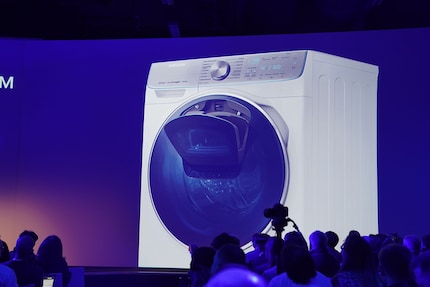
But it's not just about the washing. Picture, sound, cooking appliances and more should connect seamlessly to make your life at home easier and more enjoyable.
"A home full of life needs appliances full of ideas," says Dan Harvie, Vice President of Home Appliances Europe. He talks at length about hashtags and dinner parties as well as what millennials want from their technology.
Smart Things fulfils all these wishes, of course. As long as all the devices in your household are either from Samsung or have open programme interfaces, you can control them all with the app. He makes an example of a text message that you can send from your fridge to your mum using an S Pen. For whatever reason you might want to do that. A little more useful: the fridge can display your meal plan on a screen.
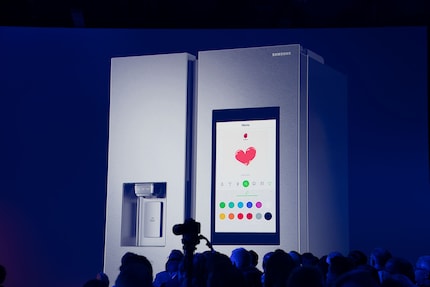
To this end, he introduces the Dual Cook Flex, an oven in which you can bake several dishes at the same time. The upper and lower doors of the appliance give access to two completely separate oven compartments.
Samsung is currently undergoing a transformation. Of course, this leaves room for speculation, because where the manufacturer once dominated the smartphone sector with devices, the S9 is not really taking the next step. Sure, the media professionals in Berlin are eagerly awaiting the S10, but we are discussing the new direction even more. One press release in particular caught our attention. It states that Samsung wants to invest 18 billion US dollars in research and development. The areas of investment:
Smartphones are strangely absent. Is Samsung going out of business? Will the Galaxies and Notes of the future be a mere shadow of their ancestors? Possibly. What is clear, however, is that Samsung is climbing the ladder. Because AI is spreading rapidly. If a company can compete in the top positions, then other manufacturers will use the software. Hence Samsung's strange obsession with the Bixby assistant, which is actually useless for the Swiss. Hence the isolation on the Smart Things platform, which controls all smart Samsung devices. From refrigerators to televisions and multi-room systems. HS Kim confirmed this speculation in his speech.
The semiconductors also speak in favour of this course, because semiconductors are built into every phone and every smart device. If Samsung can position itself here, the South Koreans will be able to supply not just one smartphone brand with hardware, but all of them. Just like the company already does with AMOLED screens.
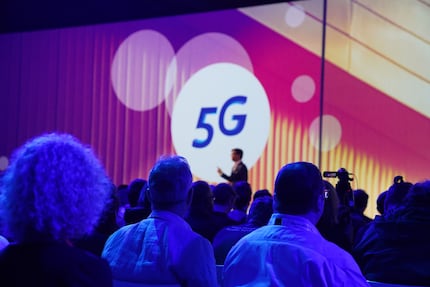
The new 5G network standard should make it possible for the first time for mobile devices to no longer have to provide massive computing power themselves. The intelligence can be located somewhere in the cloud and the device in your pocket is just a display device with limited computing power of its own. This is because the speeds promised by 5G enable speeds of over one gigabit over mobile data. According to HS Kim, the first nationwide project is being launched in the USA.
Journalist. Author. Hacker. A storyteller searching for boundaries, secrets and taboos – putting the world to paper. Not because I can but because I can’t not.
From the latest iPhone to the return of 80s fashion. The editorial team will help you make sense of it all.
Show all